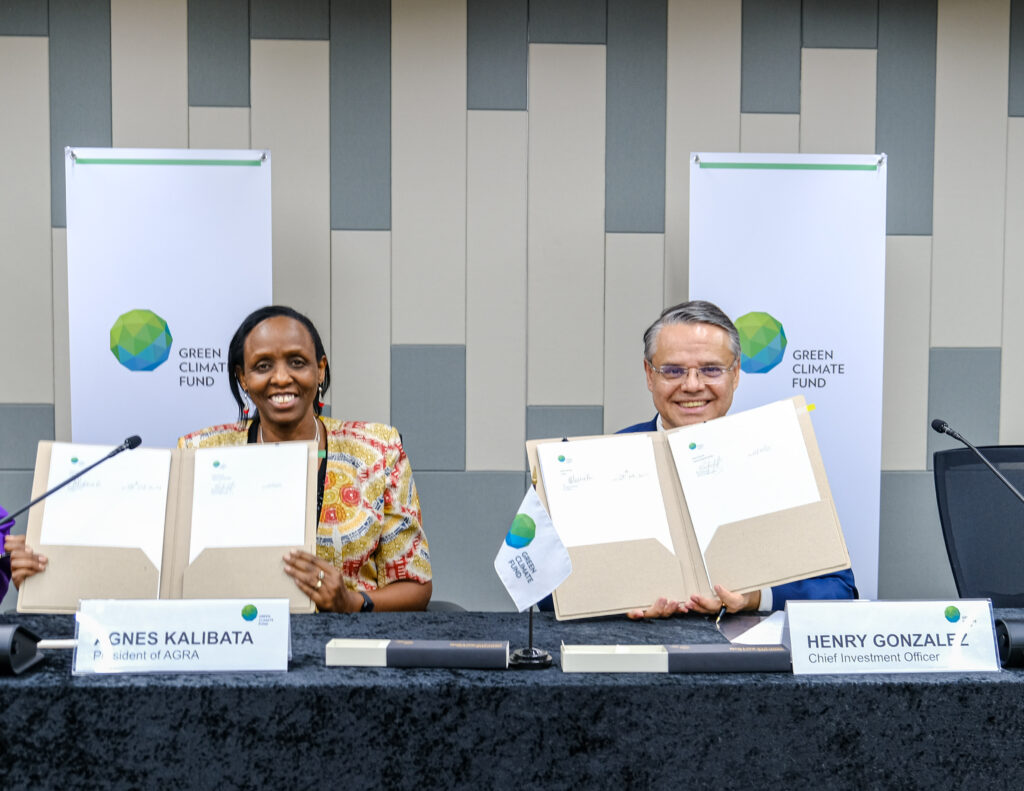AGRA, Green Climate Fund Partner to Launch USD 105 million Food Loss Reduction Program in Africa

AGRA has partnered with the Green Climate Fund (GCF) to drive climate-resilient and sustainable agriculture driving food loss reduction across Africa. The approval of this initiative under GCF’s pilot Project-Specific Assessment Approach (PSAA) RE-GAIN will enable AGRA to implement innovative solutions that strengthen smallholder farmers’ adaptation to climate change while enhancing food security.
The programme, aligned with the GCF ’s commitment to accelerating climate action across numerous countries, is designed to build smallholder climate resilience and adaptive capacity by promoting the wide scale adoption of food loss reduction solutions (“FL-RS”), while reducing the carbon footprint of agri-food systems in the seven Host Countries. This initiative will contribute to long-term resilience and economic stability in Africa’s agricultural sector by leveraging public-private partnerships.
By building the capacity of target communities to tackle climate-triggered food losses, RE-GAIN will improve access to financing, promote context-specific innovations, and create better conditions for public and private investments. As a result, these countries will develop climate-resilient economies that enhance food security while contributing to their Nationally Determined Contribution emissions reduction targets by 2030. This transformation will be driven by resilient smallholder farmers, MSMEs, and rural communities. The total grant funding amounts to USD 105 million.
Henry Gonzalez, Chief Investment Officer of GCF, said: “This project has been approved under GCF’s pilot Project-Specific Assessment Approach, which is designed to streamline access to GCF finance and facilitate wider partnerships. The approval of this project demonstrates how the PSAA modality continues to accelerate access to GCF resources, reduce transaction costs, and facilitate the implementation of innovative climate projects with new partners.”
The partnership will see AGRA invest in strengthening the capacity of small businesses to provide support to small holder farmers in 7 countries namely; Burkina Faso, Ethiopia, Kenya, Malawi, Tanzania, Uganda, and Zambia to access post-harvest equipment.
Dr. Agnes Kalibata, President of AGRA, welcomed the collaboration, noting its potential to transform African agriculture:
“This partnership with GCF marks a significant milestone in AGRA’s mission to build climate-resilient food systems across the continent. Investing in smallholder farmers and equipping them with the tools and knowledge to adapt to climate challenges, will pave the way for a more sustainable and food-secure Africa.”
Sub-Saharan Africa faces unprecedented opportunities and challenges for agricultural transformation, driven by the demands of a rapidly growing population and a changing climate. The effects of climate change are already severe in Africa, exacerbating the continent’s food insecurity and climate vulnerability challenges.
As the first GCF programme targeting food loss reduction, this initiative holds significant potential for transformative change in Africa. It will directly benefit close to 5 million people. RE-GAIN was brought under the Project-Specific Assessment Approach (PSAA), an initiative to streamline and broaden access to GCF finance for new partners, countries, and technologies. GCF’s Project Preparation Facility (PPF) support was deployed to help develop the initiative.
Food loss remains one of the biggest threats to food security, farmer incomes, and climate resilience in Africa. Smallholder farmers and MSMEs often struggle with post-harvest losses due to limited access to technologies, weak market linkages, and policy gaps. RE-GAIN aims to change this. This initiative has the potential for transformative impact, ensuring that more food reaches consumers, farmers gain more value from their harvests, and climate resilience is strengthened across food systems.




